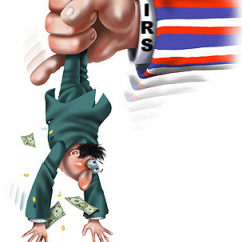Articles and News
WHAT TAXES CAN SMALL BUSINESS OWNERS EXPECT IN 2012? December 07, 2011 (0 comments)

Merrick, NY—What taxes can small business owners expect in 2012? Will they get any relief or be handed more burdens?
According to this article in Small Business Trends, some of both. Barbara Weltman, a tax attorney and author of J.K. Lasser’s Small Business Taxes and The Complete Idiot’s Guide to Starting a Home-Based Business, predicts some perks small businesses currently enjoy probably will be extended at least for another year, but unemployment taxes in certain states will rise, and it’s not only the Feds who are looking for revenue, most states and municipalities are looking for more money anywhere they can find it. These are the trends Weltman says will shape tax policy in 2012:
- The acrimonious political climate is going to make taxes a hot potato topic. But with the federal deficit over $15 trillion, taxes need to be part of the conversation, however vitriolic the discussions may get.
- Tax audits of businesses on the rise. A popular audit topic will be correct classification of an independent contractor vs. someone who should be treated as an employee.
- Uncertainty remains about health care rules. The fate Obamacare is up in the air—the Supreme Court agreed to hear a case brought by the National Federation of Independent Businesses (NFIB) and 26 states’ attorneys general—but until it hands down a ruling (expected by June), businesses must obey the law. A key feature of the law is a tax credit that was supposed to make it easier on small businesses to offer better health coverage to employees, but relatively few companies use it. NFIB has suggested a new credit that’s easier to understand and compute.
- Some favorable tax rules may be extended. These include the 100 percent bonus depreciation and up to $500,000 of first-year expensing (the Section 179 deduction), the 100 percent exclusion for gain from the sale of qualified small business stock (stock in certain C corporations held more than five years), the research credit, and the work opportunity credit for hiring individuals from certain targeted groups (only certain veteran groups are set to apply after 2011).
- State and local governments are hungry for revenue. Many are in dire need and looking for any way they can to raise revenue.
- Unemployment taxes in 20 states will rise. These are states that borrowed from the Fed to pay for unemployment benefits and haven’t yet repaid the loans.
- Estate planning for business owners remains challenging. The current rules apply only through the end of 2012; after that they revert to pre-Bush era rules when, instead of a $5 million exemption, it goes back to $1 million. It’s deemed particularly hard on small businesses, whose heirs often have to sell off parts of the business to pay the taxes when the owners die. Expect loud debate on this issue.
- Filings by paid preparers will be exclusively online.
- Low interest rates (3%) used by the IRS as penalties for underpaying estimated tax offer little incentive to pay up in advance. Business often consider the 3% small compared with the value of retaining cash for cash flow; however, it doesn’t work indefinitely. The full amount must be paid by April or it triggers both penalties and interest.
- The U.S. tax system is likely to become more and more complex.







